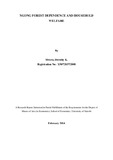| dc.description.abstract | Rural households depend on freely-provided forest goods and services for their welfare. Household budget surveys do not incorporate forest income and as a result their impact to household income, consumption and general welfare is misunderstood. This study attempted to examine the economic contribution made by Ngong forest to rural households that surround it. The study area that the sample was drawn from was the Kibiko Holding Ground with a population of 1,025 and 199 households. The study population was 199 households as households were the study unit. A sample size of 55 households was identified through systematic random sampling. Results indicated that the forest resources that are mostly extracted by the households are firewood, followed by honey, poles, vegetables and finally medicinal herbs. Study results also revealed that only the count of livestock and the quintile income mattered in the extraction of forest resources. The rest of the socioeconomic factors (gender, literacy, years of education, age, family size, family composition, sickness shocks) did not matter for forest resource extraction. The extraction of absolute forest resources is highest in the top 20% (richest households). However, the share of forest resources to total household income is highest in the lowest 20% (poorest households). The estimated monthly extraction of forest resources per household was KES 5,309. The study concluded that poorer households are more resource dependent than the rich. In addition, forest income contributes significantly towards household welfare. Hence, an effort to balance between environmental concerns and sustainable livelihoods should ensure that families living in the area are paid an equivalent KES 5,309 per month to alleviate their suffering in case they were to be translocated to other non forest areas. | en_US |

